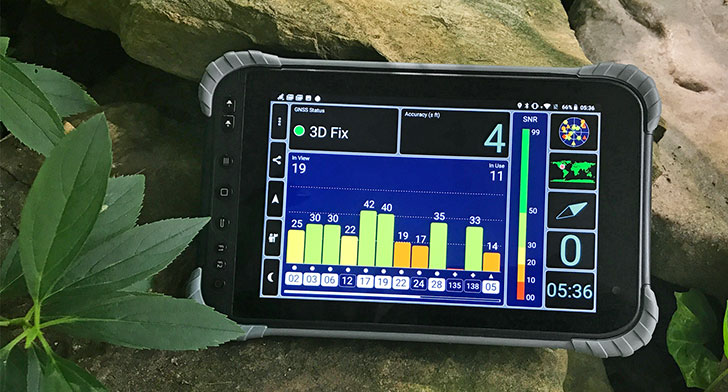|
Juniper Systems Cedar CT8
Rugged computing experts offer economically priced, full-featured, field-ready IP67-sealed 8-inch Android tablet
(by Conrad H. Blickenstorfer)
Juniper Sytems introduced the Cedar CT8 Rugged Tablet running Android Spring 2019 to complement its low cost line of Cedar branded mobile data collection and communication tools. The CT8 succeeds Juniper's earlier and somewhat smaller CT7 and CT7G tablets, and represents the company's acknowledgement of Android's rapidly growing presence in lower cost, but increasingly "grown up" and powerful, ruggedized field computing hardware.
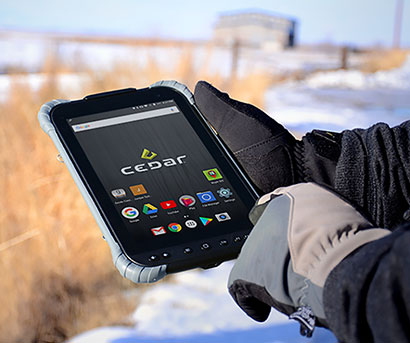
The Cedar product line was launched by Juniper Systems a few years ago to meet the needs of customers who do not need ultra-rugged devices but aren't comfortable with entrusting their outdoor work to fragile consumer technology in a case. Cedar branded devices are built from the ground up for ruggedness, support the cell bands used in Juniper's target markets, have proper IMEI (International Mobile Equipment Identity) numbers for security, and have, of course, passed all the requisite governmental compliance testing.
The Cedar CT8 is an 8-inch class tablet running Android 8.1 (Oreo) with Google Mobile Services on a competent Qualcomm Snapdragon 626 processor. The display offers 1280 x 800 pixel (189 ppi) resolution. That's not quite "retina" level but sharp enough for the intended applications. Like virtually all contemporary handheld devices, the Cedar CT8 has quick and effortless capacitive multi-touch. Its LCD display uses IPS (In Plane Switching) technology for a solid, stable image with god contrast and perfect viewing angles from all directions.
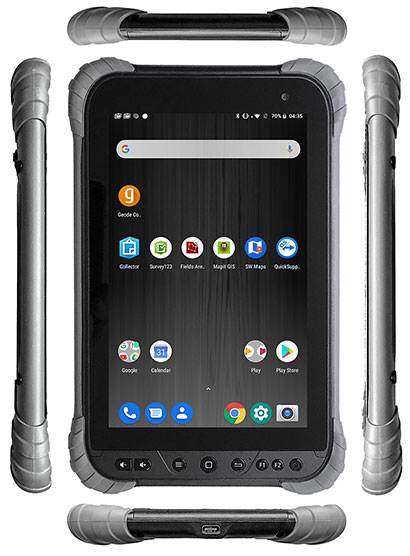
Being a ruggedized device with prominent corner protection and a number of physical buttons (including two programmable ones), the CT8's 9.5 x 6 inch footprint is larger than that of consumer tablets with the same size display but minuscule (or missing) bezels. The generous margins around the display actually make the CT8 easier to hold and handle. For a rugged device, the CT8 doesn't weigh much either; our review unit weighed 1.36 pounds, about the same as its CT7G predecessor.
Up-to-date tech
For tech specs, the Cedar CT8's Snapdragon 626 CPU is a 2.2GHz octa-core 64-bit design that is also seeing duty in a large number of consumer smartphones. It includes an Andreno 506 graphics processor. There are 3GB of RAM and 32GB of Flash for storage, plus whatever card you have in the micro SDXC card slot. There is an 16mp documentation autofocus camera with LED flash on the backside, and a 5.0mp vidcam in the front.
For wireless communication there's fast dual-band 802.11 a/b/g/n/ac WiFi, Bluetooth 4.1, NFC, integrated GNSS (GPS/GLONASS/Beidou), as well as 2G, 3G and 4G LTE cellular radio via two separate nano SIM cards. All wired communication goes through a modern, reversible USB Type-C port.
Since the CT8 will be used by many geomatics industry and geospatial technology customers, the unit comes with a full gamut of internal sensors, including a G-sensor, distance/light sensing, a 3-axis gyroscope, an e-Compass, and geomagnetic sensing.
The CT8's 3.8V/8,000mAh/30.4Wh Lithium-Ion polymer battery is replaceable and externally accessible. That makes it possible to take along a spare for quick swapping, and it also makes replacing an end-of-life battery a non-issue. The plastic battery compartment cover has a replaceable pressure seal and four lockable levers to keep liquids out from the interior of the CT8. Since the two SIM cards and the micro SD card slots are all underneath the battery, care is advised when putting the cover back in place.
In terms of performance, the Cedar CT8 impresses as well. For now, Android benchmarks aren't as reliable an indicator of device performance as is the case in the Windows realm, but the CT8's AnTuTu and PassMark Mobile results are right up there with the latest competition in the rugged handheld and tablet space.
Rugged inside
There should rarely ever be a reason to take a Cedar CT8 apart. That doesn't mean we didn't take a look inside the tablet. It's been RuggedPCReview's longstanding tradition to make sure (rugged) beauty isn't just skin-deep. What a rugged device looks like inside is even more important than what it looks like outside.
To open up the CT8, undo 21 small Torx T5 screws, all of identical size, and unsnap a short ribbon cable connector. The CT8's two polymer halves then easily separate. Sealing is via a tongue and groove design with a precision-cut orange pressure seal sitting in the groove. As is usually the case in highly integrated tablets and handhelds, the electronics are very compact. Details impress. The few visible wires are all neatly guided in their own little conduits in the polymer housing. Equally impressive is the precise application of white silicone glue dollops wherever they are needed to keep things in place or for extra sealing. Very neat, very clean. That is not a given. Reassembly is needlessly trying due to the obscured location of the short ribbon cable connector.
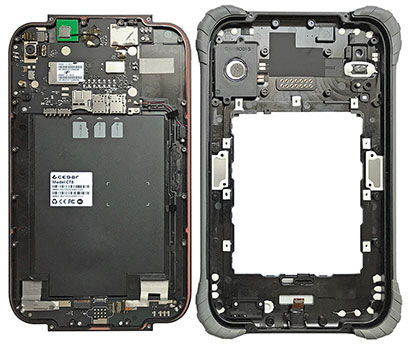
All of the CT8 tablet's controls are implemented as hardware buttons below the bottom of the display: volume up and down, the three standard Android buttons, two programmable function buttons, and power. There's a handstrap mount that screws onto the back of the unit. Also on the back is a screw hole pattern for available add-on modules such as a 1D/2D barcode reader or an RFID reader.
Rugged outside
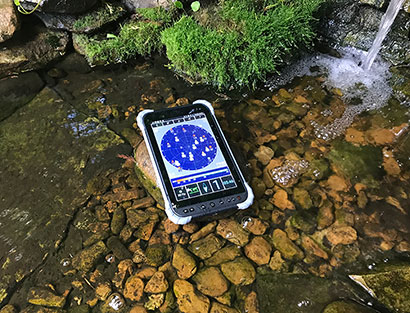
Its prominent light-gray corner guards and side protection instantly make it clear that the Cedar CT8 is a tough, rugged product. The specs include IP67 ingress protection (totally dust-proof, submersible to one meter for 30 minutes), a wide -4° to 140°F operating temperature range, and a 1-meter (3.3 feet) shock and drop resistance to concrete (we think it can handle a lot more and fully expect Juniper doing one of its famous videos to show just that).
Excellent cameras
There was a time when cameras integrated into rugged devices were rarely up to the job (most, in fact, were terrible). With the worldwide proliferation of Android devices, that's changed dramatically, and the Cedar CT8 benefits from that. Both of its cameras — 5-megapixel facing the user, 16-megapixel with LED flash facing away — are very good, as is the standard Android Camera app.
The sample pics below were taken with the CT8's documentation camera in 4608 x 3456 pixel resolution. Click on it for a full-size representation.
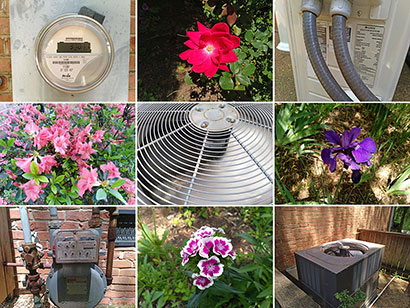
Unlike most cameras integrated into rugged devices, the CT8's even supports 4K video. And the Camera app supports setting different frame rates.
Positioning
GPS — determining the precise location of a device for navigation or other positioning tasks — has become an integral part of virtually all tablets and handhelds. Since many Juniper customers rely on better than average positioning accuracy, the Cedar CT8 delivers location data accurate to within one meter under open skies and five meters underneath a dense tree canopy. That's significantly better than standard consumer tablets and phones. The CT8 also has a port for external antenna connection.
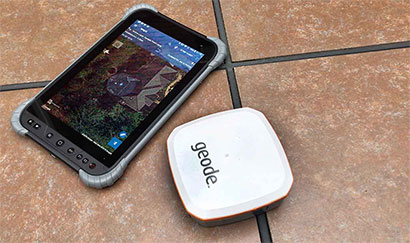
For even better positioning accuracy, Juniper System's stand-alone Geode GPS receiver provides sub-meter accuracy (and even better with post-processing). For RuggedPCReview's assessment of the Juniper Geode, see our report.
Pricing
For a list price of US$999, customers get a remarkably tough state-of-the-art Android device with a display larger than even the biggest phone, but in a package that's smaller and handier than any standard size tablet.
With its replaceable battery, optional barcode and RFID reader attachments, excellent onboard cameras, and powerful geo-location data collection capabilities, the Cedar CT8 presents an attractive alternative to fragile consumer devices for numerous outdoor applications. -- Conrad Blickenstorfer, May 2019 |



